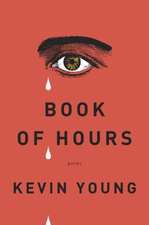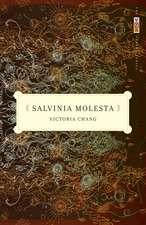Circle: Crab Orchard Series in Poetry
Autor Victoria Changen Limba Engleză Paperback – 3 mar 2005
Taking its concept of concentricity from the eponymous Ralph Waldo Emerson essay, Circle, the first collection from Victoria Chang, adopts the shape as a trope for gender, family, and history. These lyrical, narrative, and hybrid poems trace the spiral trajectory of womanhood and growth and plot the progression of self as it ebbs away from and returns to its roots in an Asian American family and context. Locating human desire within the helixes of politics, society, and war, Chang skillfully draws arcs between T’ang Dynasty suicides and Alfred Hitchcock leading ladies, between the Hong Kong Flower Lounge and an all-you-can-eat Sunday brunch, the Rape of Nanking and civilian casualties in Iraq.
Din seria Crab Orchard Series in Poetry
-
 Preț: 99.70 lei
Preț: 99.70 lei -
 Preț: 84.18 lei
Preț: 84.18 lei - 26%
 Preț: 123.10 lei
Preț: 123.10 lei - 27%
 Preț: 121.92 lei
Preț: 121.92 lei - 37%
 Preț: 122.53 lei
Preț: 122.53 lei -
 Preț: 92.59 lei
Preț: 92.59 lei - 26%
 Preț: 122.53 lei
Preț: 122.53 lei - 27%
 Preț: 121.36 lei
Preț: 121.36 lei -
 Preț: 78.93 lei
Preț: 78.93 lei - 27%
 Preț: 121.30 lei
Preț: 121.30 lei - 27%
 Preț: 121.92 lei
Preț: 121.92 lei - 26%
 Preț: 122.53 lei
Preț: 122.53 lei - 27%
 Preț: 121.92 lei
Preț: 121.92 lei - 30%
 Preț: 121.96 lei
Preț: 121.96 lei - 26%
 Preț: 122.53 lei
Preț: 122.53 lei - 30%
 Preț: 121.92 lei
Preț: 121.92 lei - 30%
 Preț: 122.53 lei
Preț: 122.53 lei - 26%
 Preț: 122.53 lei
Preț: 122.53 lei -
 Preț: 80.20 lei
Preț: 80.20 lei - 22%
 Preț: 115.73 lei
Preț: 115.73 lei - 22%
 Preț: 115.14 lei
Preț: 115.14 lei - 26%
 Preț: 122.53 lei
Preț: 122.53 lei -
 Preț: 84.75 lei
Preț: 84.75 lei - 27%
 Preț: 121.92 lei
Preț: 121.92 lei -
 Preț: 75.64 lei
Preț: 75.64 lei - 27%
 Preț: 121.92 lei
Preț: 121.92 lei - 27%
 Preț: 121.92 lei
Preț: 121.92 lei - 27%
 Preț: 121.92 lei
Preț: 121.92 lei - 27%
 Preț: 121.96 lei
Preț: 121.96 lei - 30%
 Preț: 122.53 lei
Preț: 122.53 lei - 26%
 Preț: 122.53 lei
Preț: 122.53 lei - 26%
 Preț: 122.53 lei
Preț: 122.53 lei - 27%
 Preț: 121.92 lei
Preț: 121.92 lei - 27%
 Preț: 121.92 lei
Preț: 121.92 lei - 26%
 Preț: 122.53 lei
Preț: 122.53 lei -
 Preț: 121.73 lei
Preț: 121.73 lei - 27%
 Preț: 121.92 lei
Preț: 121.92 lei - 30%
 Preț: 122.29 lei
Preț: 122.29 lei - 27%
 Preț: 121.92 lei
Preț: 121.92 lei - 30%
 Preț: 122.53 lei
Preț: 122.53 lei -
 Preț: 166.58 lei
Preț: 166.58 lei -
 Preț: 166.58 lei
Preț: 166.58 lei -
 Preț: 193.74 lei
Preț: 193.74 lei -
 Preț: 166.58 lei
Preț: 166.58 lei -
 Preț: 175.32 lei
Preț: 175.32 lei -
 Preț: 175.75 lei
Preț: 175.75 lei
Preț: 107.51 lei
Puncte Express: 161
Preț estimativ în valută:
19.01€ • 22.66$ • 16.48£
19.01€ • 22.66$ • 16.48£
Carte disponibilă
Livrare economică 24 februarie-10 martie
Livrare express 07-13 februarie pentru 15.86 lei
Specificații
ISBN-13: 9780809326181
ISBN-10: 0809326183
Pagini: 80
Dimensiuni: 152 x 229 x 8 mm
Greutate: 0.14 kg
Ediția:1st Edition
Editura: Southern Illinois University Press
Colecția Southern Illinois University Press
Seria Crab Orchard Series in Poetry
ISBN-10: 0809326183
Pagini: 80
Dimensiuni: 152 x 229 x 8 mm
Greutate: 0.14 kg
Ediția:1st Edition
Editura: Southern Illinois University Press
Colecția Southern Illinois University Press
Seria Crab Orchard Series in Poetry
Notă biografică
Victoria Chang’s poems have appeared in Poetry, The Nation, Virginia Quarterly Review, Kenyon Review, New England Review, Threepenny Review, Best American Poetry 2005, and other publications, and she is the editor of the anthology Asian American Poetry: The Next Generation. She has earned degrees from the University of Michigan, Harvard University, and Stanford University, and is the recipient of a Bread Loaf Scholarship, a Kenyon Writer’s Workshop Taylor Fellowship, the Hopwood Award, and the Holden Minority Fellowship from the MFA program at Warren Wilson College. She resides in Los Angeles.
Extras
TO WANT
To wait is to want more.
Or to think you want more.
Take a look backyard for the stitches
that seam everything together.
It's unruly back there, yes, but
when there is time, weeds
want and want, an infinite
accordion-to want what they
cannot have, no mirrors
to show them how they look or
lie. How many toys
do children need? For my home,
a rug, yoga mat, clear wax
candles, bath rack with bubble
crystals, a man. You are not for sale,
but other women do not
know this. You do not bother
telling them. I am tempted
to dial each of them up, to inform
them (because of my compassion)
of their safety violation. Wait.
Dig a garden. Eat only junk food.
Buy a strange pet with short legs.
Always pick up the phone when you call.
HONG KONG FLOWER LANGUAGE
They say fat finds the female
brain, while the heart remains thin.
And it was as if the waitresses
knew my plan to win him from her,
or at least to test him out. I blamed
my lack of progress on the waitresses
(pushers of carts). They returned,
a finding-lost-money obsession.
Glass of water? Chicken feet?
Pork bun? As if to say, help, we must
extinguish her. I wanted him to tell
her about our autumns in Vermont
(well not really, but close enough),
the autumns in his mind of Vermont,
or the Vermont in my autumn-
any combination to avoid lines,
the shopping mall of men. And it
didn't matter that I recently had
my stomach pumped of cheating
ones, the spraining-of-the-heart kind.
Who said good habits pay off later?
They just left me on the couch
alone, watching the best
of the new season, the hottest gadgets
and ab-crunchers. Your skin
is the only suit you'll have
for a lifetime. Mine, the darkest shade-
darker than the fish's eye.
EDWARD HOPPER STUDY: ROOM IN NEW YORK
The woman's finger hangs
above the F key. She always
wears the same red dress.
The man's hands cup
the newspaper edge, his face
ashen, half-edible.
The woman's back
to the man, head down,
her arm, dairy and bloated,
long before men preferred
peeling brown shoulders,
the midriff. She can't leave him,
doesn't know how.
How many times have you
heard this? You will hear it
again and again, like the F key
that in a moment will
glaze the room with its
throbbing mouth.
THE GOAL
My father's body curled like a fist
as he perched over the pavement,
unhandsome with manuals and parts,
brackets and backboard. He was lost
in the alleys of his city, where genetics
still mattered, and alleles meant pair.
One dusk, the backboard mounted
against the moon, against crickets
working. I tossed the ball, watched
the net open its walls. Each night,
I barreled to the net with ease, found
the unfindable opening, until the pole
shifted in the mud, like my father's eyes
when he knew I was getting too good.
SEVEN CHANGES
At night your growth rate doubles and each morning I spot
yet another Chang
in the newspaper, staring at me with its dull lamps. I limp up
a mountainside
towards a growing opal. Oracle, is this the way up to the little office
with orange lights?
Let's not argue this time. For the last time, we argued
over the arrival
of another Victoria Chang. Changed from Valerie to Victoria
and now my ruin,
for she, a track star, runs faster than a seashore. Shared bunks
were never favored by me,
a has-been-girl or even worse, a not-yet-girl. And don't even mention
the others-
faces smashed against the door, Helen Chang, Heather Chang,
Hilary Chang.
And with each new Chang, the shock of the world goes down,
drawn to the next eyeless eel
or the one-legged constellation. The next seven Victoria Changs,
all victorious,
in rows, each a little taller than the last. Their fevered footsteps persist,
fist me into midnights.
To wait is to want more.
Or to think you want more.
Take a look backyard for the stitches
that seam everything together.
It's unruly back there, yes, but
when there is time, weeds
want and want, an infinite
accordion-to want what they
cannot have, no mirrors
to show them how they look or
lie. How many toys
do children need? For my home,
a rug, yoga mat, clear wax
candles, bath rack with bubble
crystals, a man. You are not for sale,
but other women do not
know this. You do not bother
telling them. I am tempted
to dial each of them up, to inform
them (because of my compassion)
of their safety violation. Wait.
Dig a garden. Eat only junk food.
Buy a strange pet with short legs.
Always pick up the phone when you call.
HONG KONG FLOWER LANGUAGE
They say fat finds the female
brain, while the heart remains thin.
And it was as if the waitresses
knew my plan to win him from her,
or at least to test him out. I blamed
my lack of progress on the waitresses
(pushers of carts). They returned,
a finding-lost-money obsession.
Glass of water? Chicken feet?
Pork bun? As if to say, help, we must
extinguish her. I wanted him to tell
her about our autumns in Vermont
(well not really, but close enough),
the autumns in his mind of Vermont,
or the Vermont in my autumn-
any combination to avoid lines,
the shopping mall of men. And it
didn't matter that I recently had
my stomach pumped of cheating
ones, the spraining-of-the-heart kind.
Who said good habits pay off later?
They just left me on the couch
alone, watching the best
of the new season, the hottest gadgets
and ab-crunchers. Your skin
is the only suit you'll have
for a lifetime. Mine, the darkest shade-
darker than the fish's eye.
EDWARD HOPPER STUDY: ROOM IN NEW YORK
The woman's finger hangs
above the F key. She always
wears the same red dress.
The man's hands cup
the newspaper edge, his face
ashen, half-edible.
The woman's back
to the man, head down,
her arm, dairy and bloated,
long before men preferred
peeling brown shoulders,
the midriff. She can't leave him,
doesn't know how.
How many times have you
heard this? You will hear it
again and again, like the F key
that in a moment will
glaze the room with its
throbbing mouth.
THE GOAL
My father's body curled like a fist
as he perched over the pavement,
unhandsome with manuals and parts,
brackets and backboard. He was lost
in the alleys of his city, where genetics
still mattered, and alleles meant pair.
One dusk, the backboard mounted
against the moon, against crickets
working. I tossed the ball, watched
the net open its walls. Each night,
I barreled to the net with ease, found
the unfindable opening, until the pole
shifted in the mud, like my father's eyes
when he knew I was getting too good.
SEVEN CHANGES
At night your growth rate doubles and each morning I spot
yet another Chang
in the newspaper, staring at me with its dull lamps. I limp up
a mountainside
towards a growing opal. Oracle, is this the way up to the little office
with orange lights?
Let's not argue this time. For the last time, we argued
over the arrival
of another Victoria Chang. Changed from Valerie to Victoria
and now my ruin,
for she, a track star, runs faster than a seashore. Shared bunks
were never favored by me,
a has-been-girl or even worse, a not-yet-girl. And don't even mention
the others-
faces smashed against the door, Helen Chang, Heather Chang,
Hilary Chang.
And with each new Chang, the shock of the world goes down,
drawn to the next eyeless eel
or the one-legged constellation. The next seven Victoria Changs,
all victorious,
in rows, each a little taller than the last. Their fevered footsteps persist,
fist me into midnights.
Cuprins
CONTENTS
Acknowledgments
Part One: On Quitting
To Want
Sarah Emma Edmonds
Eva Braun at Berchtesgaden
Lisa Fremont
Yang Gui Fei
Seven Reasons for Divorce
On Sameness
Year of the Bombshell
Hong Kong Flower Lounge
Man in the White Truck
Preparations
KitchenAid Epicurean Stand Mixer
Edward Hopper Studies
Hotel Room
Office at Night
Room in New York
Before
On Quitting
Part Two: Five-Year Plan
The Laws of the Garden
Five-Year Plan
$4.99 All You Can Eat Sunday Brunch
The Goal
Chinese Speech Contest
Holiday Parties
An Evening at the Chinese Opera
Morning Porridge
At Lake Michigan
There Is Something about the East Coast
Golden Valley
First Halloween
Majority Rules
Mostly Ocean
Dragon Inn
Part Three: Limits
Lantern Festival
Flight
The Tower of London
Seven Changs
Planting Tulips
Instinct
Damage
Gamble House
Human Inventory
Limits
Animal Models
Taiwan Independence
Grooming
Face
Meditation at Petoskey
Acknowledgments
Part One: On Quitting
To Want
Sarah Emma Edmonds
Eva Braun at Berchtesgaden
Lisa Fremont
Yang Gui Fei
Seven Reasons for Divorce
On Sameness
Year of the Bombshell
Hong Kong Flower Lounge
Man in the White Truck
Preparations
KitchenAid Epicurean Stand Mixer
Edward Hopper Studies
Hotel Room
Office at Night
Room in New York
Before
On Quitting
Part Two: Five-Year Plan
The Laws of the Garden
Five-Year Plan
$4.99 All You Can Eat Sunday Brunch
The Goal
Chinese Speech Contest
Holiday Parties
An Evening at the Chinese Opera
Morning Porridge
At Lake Michigan
There Is Something about the East Coast
Golden Valley
First Halloween
Majority Rules
Mostly Ocean
Dragon Inn
Part Three: Limits
Lantern Festival
Flight
The Tower of London
Seven Changs
Planting Tulips
Instinct
Damage
Gamble House
Human Inventory
Limits
Animal Models
Taiwan Independence
Grooming
Face
Meditation at Petoskey
Recenzii
“Emerson claims in his essay ‘Circles’ that ‘the past is always swallowed and forgotten.’ But Victoria Chang, in her superb first book Circle, interrogates a substantial portion of what Emerson would erase: the tyranny of Maoist China and the Red Brigade, the remote reserve of her Asian American family, her own experience in high finance and the jet-set 90s, and so much more. Nothing’s too large or small for this alchemical poet, from a Kitchenaid mixer to Eva Braun at Berchtesgaden to the most serene rendering of an oceanside landscape. Her technical skills are flexible and powerful, her voice is fearless yet capable of great lyrical tenderness, and her vision—global, principled, sympathetic—is a gift to contemporary poetry in America during a needful time.”—David Baker, author of Changeable Thunder
“Victoria Chang’s Circle denotes a geometry of enclosure that brings into itself all the fractious identities of contemporary American life. The lives of women, immigrants, artful self-making--all these are investigated and sung into newness by her canny poems. Time and again the astringency of her lines arrives at a clarifying lyricism, restoring a complex mystery to the everyday. This is a book of powerful poems, from a poet we are now very privileged to hear from.”—Rick Barot, author of The Darker Fall
“[It’s] a real pleasure to find a first book that thinks big, that harbors the best sort of ambitions, not to be acclaimed, but to stretch itself. [Circle] frequently brings Randall Jarrell to mind, both in its wide range of subjects, including art, film, and history, in its many dramatic monologues, and particularly in its fundamental inquiry into the slippery nature of identity. . . . As Chang continues her explorations, it will be not only comforting but also exhilarating to watch her transformations toward full maturity as a poet. Certainly, her first book promises delights to come.”—Blackbird
“A thirst for the self / in everything – even / in the sweet chinks of mandarin . . . .”
“Victoria Chang’s Circle denotes a geometry of enclosure that brings into itself all the fractious identities of contemporary American life. The lives of women, immigrants, artful self-making--all these are investigated and sung into newness by her canny poems. Time and again the astringency of her lines arrives at a clarifying lyricism, restoring a complex mystery to the everyday. This is a book of powerful poems, from a poet we are now very privileged to hear from.”—Rick Barot, author of The Darker Fall
“[It’s] a real pleasure to find a first book that thinks big, that harbors the best sort of ambitions, not to be acclaimed, but to stretch itself. [Circle] frequently brings Randall Jarrell to mind, both in its wide range of subjects, including art, film, and history, in its many dramatic monologues, and particularly in its fundamental inquiry into the slippery nature of identity. . . . As Chang continues her explorations, it will be not only comforting but also exhilarating to watch her transformations toward full maturity as a poet. Certainly, her first book promises delights to come.”—Blackbird
“A thirst for the self / in everything – even / in the sweet chinks of mandarin . . . .”
“This does not sound like a first book, does it? With astringent understatement and wry economy, with nuance and intelligence and an enviable command of syntax and poetic line, Victoria Chang dissects the venerable practices of cultural piety and self-regard. She is a master of the thumbnail narrative. She can wield a dark eroticism. She is determined to tackle subject matter that is not readily subdued to the proportions of lyric. Her talent is conspicuous, and this book a most impressive debut.”—Linda Gregerson, author of Waterborne
Chang's poems concern themselves with, among numerous topics, the lives of women. Not just the Chinese American woman - daughter, mother, grandmother - but also women in general: athelte, "bombshell", business-woman, gardener, lover. As well as women in history and art: Sarah Emmon Edwards, who joined the Union Army as a man; Eva Braun, Hitler's mistress; Yang Gui Fei, "favored concubine" of a Chinese emperor; and women in Edward Hopper's paintings. Chang's techniques are confident and varied: the unbalanced couplet, with the first line always longer than the second to keep readers off balance; synesthesia for tension and lyricism; wry and muscular diction. The book's ending phrase is an homage to Chang's foremother in Asian American poetry circles, Cathy Song: "a thousand young larks mount the sudden breeze." A paean to healing.











